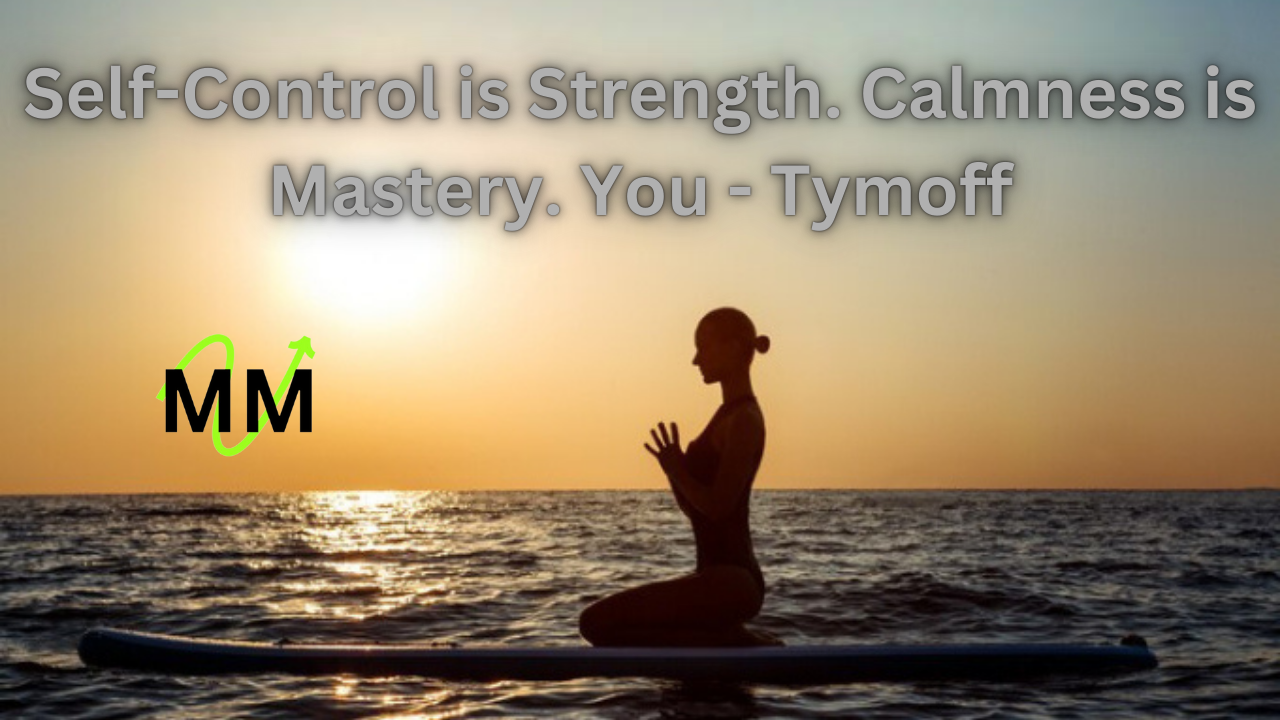Self-Control is Strength. Calmness is Mastery. You – Tymoff

In today’s fast-paced world, where instant gratification is often just a click away, self-control and calmness have become increasingly valuable traits. They are not just virtues but essential skills that can determine the course of our lives, both personally and professionally. The concept encapsulated by the phrase “Self-Control is Strength. Calmness is Mastery. You – Tymoff” serves as a powerful reminder that mastering oneself is the key to navigating the complexities of life. This article will explore why self-control is a form of strength, why calmness equates to mastery, and how these qualities intertwine to shape a resilient and focused individual.
The Power of Self-Control
Understanding Self-Control
Self-control is the ability to regulate one’s emotions, thoughts, and behaviors in the face of temptations and impulses. It’s the mental fortitude that allows you to pause, think, and act in a way that aligns with your values and long-term goals rather than succumbing to immediate desires. This concept is central to achieving personal success and maintaining harmonious relationships.
Imagine being in a situation where you are tempted to react impulsively, perhaps in anger or frustration. Self-control gives you the strength to hold back, consider the consequences, and choose a response that is constructive rather than destructive. It’s about making decisions that are in your best interest, even when the easier option might be to give in to a momentary desire.
Self-Control as a Form of Strength
Strength is often associated with physical power or endurance, but in a broader sense, it’s the ability to withstand challenges and remain steadfast in the pursuit of your goals. Self-control is a form of strength because it requires discipline, patience, and resilience. It’s the mental muscle that, when exercised regularly, becomes stronger and more capable of withstanding the pressures and temptations that life throws at us.
Consider the example of someone trying to lose weight. The strength to resist unhealthy foods and stick to a diet plan is not just a matter of willpower but also self-control. It’s the ability to prioritize long-term health over short-term pleasure. This form of strength is essential in various aspects of life, whether it’s saving money, maintaining a productive work routine, or cultivating positive relationships.
The Benefits of Self-Control
The benefits of self-control are far-reaching. On a personal level, it leads to better decision-making, improved emotional regulation, and greater satisfaction with life. In professional settings, individuals with high self-control are often more productive, reliable, and capable of handling stress effectively. This quality is also crucial in building and maintaining relationships, as it fosters empathy, patience, and understanding.
Moreover, self-control is linked to higher levels of happiness and well-being. Studies have shown that individuals who exercise self-control are more likely to achieve their goals, experience less regret, and have a greater sense of fulfillment. This is because self-control helps individuals stay aligned with their values and make choices that contribute to long-term happiness rather than momentary pleasure.
Calmness as Mastery
Defining Calmness
Calmness is the state of being free from agitation, excitement, or disturbance. It’s the ability to maintain a composed and serene demeanor, even in the face of stress or chaos. Calmness is not about suppressing emotions but rather about managing them in a way that allows for clear thinking and effective decision-making. It’s a mastery over one’s inner world that reflects outwardly in how one handles life’s challenges.
In a world that often rewards quick reactions and immediate results, calmness might seem like a passive or even weak quality. However, true calmness is an active state of mastery. It requires a deep understanding of oneself and the ability to control one’s emotions, thoughts, and reactions. It’s about finding that inner stillness that allows you to navigate through life with poise and grace.
Why Calmness Equals Mastery
Mastery is the ability to control and command one’s skills or emotions with proficiency. When it comes to emotional mastery, calmness is the pinnacle. It’s the ability to stay centered and composed, no matter what is happening around you. This form of mastery is crucial in high-pressure situations where emotions can easily cloud judgment and lead to poor decisions.
For instance, think of a leader who remains calm during a crisis. Their calmness not only allows them to think clearly and make rational decisions but also instills confidence and reassurance in their team. This is the essence of mastery—the ability to influence and manage not just one’s own emotions but also those of others.
Calmness is also a reflection of self-mastery because it shows that you have control over your internal state. It’s easy to be calm when everything is going well, but true mastery is demonstrated when you can maintain that calmness in the face of adversity. This ability to remain unshaken by external circumstances is what sets masters apart from the rest.
The Power of Calmness in Daily Life
Calmness has a profound impact on various aspects of life. In personal relationships, calmness allows for better communication and conflict resolution. It helps de-escalate tense situations and promotes understanding and empathy. In the workplace, calmness contributes to effective leadership, enhances problem-solving abilities, and fosters a positive work environment.
Moreover, calmness has significant health benefits. Chronic stress and anxiety can take a toll on both mental and physical health, leading to issues like hypertension, depression, and weakened immune function. Maintaining a calm disposition can help mitigate these risks and contribute to overall well-being.
Calmness also enhances creativity and productivity. When the mind is calm, it’s better able to focus, think critically, and generate innovative ideas. This is why practices like meditation and mindfulness, which cultivate calmness, are often recommended for boosting mental clarity and productivity.
Read More
The Interconnection between Self-Control and Calmness
How Self-Control Leads to Calmness
Self-control and calmness are deeply interconnected. Self-control often leads to calmness because when you can manage your impulses and reactions, you’re less likely to be overwhelmed by stress or negative emotions. This control over your inner world allows you to maintain a calm and balanced state of mind, even in challenging situations.
For example, if you have the self-control to not react immediately to a provocative comment, you give yourself the space to remain calm and consider a more thoughtful response. This ability to pause and reflect is what helps maintain calmness in the face of potential emotional triggers.
Furthermore, self-control helps reduce anxiety and stress, which are often the root causes of a disturbed mind. By exercising self-control, you can stay focused on the present moment rather than being consumed by worries or regrets. This focus and presence contribute significantly to maintaining a calm and composed demeanor.
The Feedback Loop Between Calmness and Self-Control
Just as self-control leads to calmness, calmness can also reinforce self-control. When you are calm, your mind is clear, and you are better able to exercise self-control. This creates a positive feedback loop where each quality enhances the other.
For instance, a calm mind is less likely to be swayed by impulsive desires or reactions, making it easier to exercise self-control. Conversely, when you exercise self-control, you are less likely to be disturbed by external factors, which helps maintain your calmness. This synergy between self-control and calmness is what leads to true mastery over oneself.
In this way, calmness and self-control are not just complementary but mutually reinforcing. Together, they create a strong foundation for personal growth, resilience, and success.
Applying Self-Control and Calmness in Daily Life
Practical Tips to Develop Self-Control
Developing self-control requires practice and mindfulness. Here are some practical tips to help you strengthen this vital quality:
- Mindfulness Meditation: Practice mindfulness meditation to become more aware of your thoughts and impulses. This awareness is the first step in developing self-control.
- Set Clear Goals: Having clear goals helps you stay focused and motivated, making it easier to resist distractions and temptations.
- Delay Gratification: Train yourself to delay gratification by setting small challenges for yourself, such as waiting a few minutes before eating a treat.
- Create Healthy Habits: Build habits that support your goals and reduce the need for constant self-control. For example, if you want to eat healthier, stock your home with nutritious foods.
Techniques to Cultivate Calmness
Calmness can be cultivated through various practices that promote relaxation and mental clarity:
- Deep Breathing Exercises: Practice deep breathing to calm your nervous system and reduce stress. This can be especially helpful in moments of anxiety or tension.
- Regular Exercise: Physical activity is a great way to release tension and promote a sense of calmness.
- Mindful Reflection: Spend time each day reflecting on your thoughts and emotions. This practice can help you understand your triggers and develop strategies to remain calm in difficult situations.
- Nature Walks: Spending time in nature has been shown to reduce stress and promote calmness. Make it a habit to take regular walks in a park or natural setting.
Integrating These Qualities into Your Life
To truly benefit from the power of self-control and calmness, it’s important to integrate these qualities into your daily life. You can do this by setting aside time each day for practices that promote these traits, such as meditation, exercise, and reflection. Additionally, being mindful of your reactions and making a conscious effort to practice self-control and maintain calmness in challenging situations will help you develop these qualities over time.
Read More
Conclusion
“Self-Control is Strength. Calmness is Mastery. You – Tymoff” encapsulates the essence of personal mastery. By cultivating self-control, you build the strength to resist short-term temptations and stay focused on your long-term goals. By embracing calmness, you achieve mastery over your emotions, enabling you to navigate life’s challenges with grace and composure. Together, these qualities create a powerful foundation for success, happiness, and fulfillment. In a world full of distractions and stress, the ability to remain self-controlled and calm is not just a virtue but a crucial skill for thriving in all areas of life.






